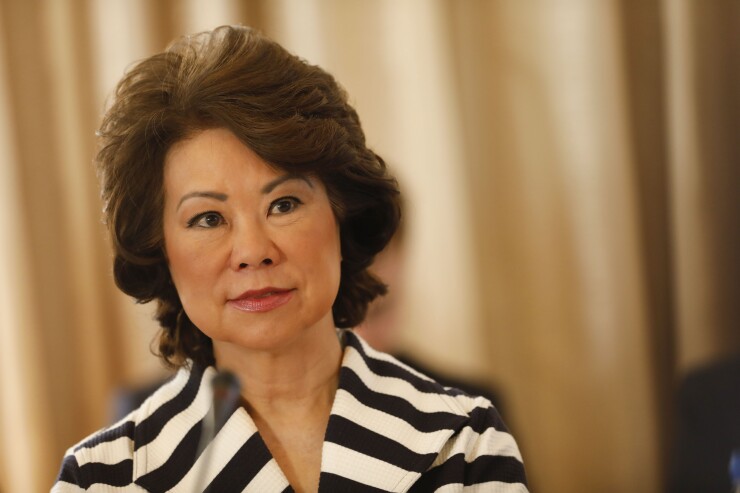DALLAS—The Trump administration will unveil the outline of the president’s long-awaited $1 trillion infrastructure plan in a few weeks and send Congress a legislative proposal in the third quarter, Transportation Secretary Elaine Chao said Monday.
“The administration will share its vision of what the infrastructure plan will look like in the next several weeks, which will kick off our collaboration with Congress,” Chao said at an event kicking off Infrastructure Week that was sponsored by the U.S. Chamber of Commerce.
“The legislative proposal probably will be tackled by Congress in the third quarter,” she said. “We are looking at ways that new projects can be made to come on stream faster so they can be funded faster and financed faster.”

Chao said the infrastructure renewal plan will include $200 billion of new direct federal funding as well as incentives designed to leverage up to $1 trillion of private investments in infrastructure.
“A key feature of the infrastructure plan will be unleashing the billions of dollars in private capital available for investment in infrastructure,” she said. “Investors have told us there is ample credit available that is waiting on infrastructure opportunities.”
States and local governments that have obtained at least some of the financing for infrastructure projects will be given top priority for the direct federal funding available in the package, Chao said.
“The goal is to use federal funds as an incentive to get projects underway and built more quickly, with greater participation by state, local and private partners,” she said.
A few special projects that are not candidates for private investment will likely be identified and funded directly, Chao said.
“Candidates for this special category may include projects that have the potential to significantly increase GDP growth, or to lift the American spirit,” she said.
The Office of Management and Budget is looking for revenue offsets that could provide the $200 billion of funding “to avoid saddling future generations with more debt,” Chao said.
“We’re talking about how to pay for it,” she said. “Perhaps tax reform or the sale of some federal assets, but we don’t know yet.”
Chao said the administration’s broad definition of infrastructure that will be funded by the proposal includes broadband, energy facilities, water utility, and hospitals for veterans.
A task force with representatives from 16 federal agencies is working on the infrastructure proposal to ensure it is broad and flexible, she said.
The interagency task force includes the Environmental Protection Agency, the Office of Management and Budget, and the departments of Treasury, Defense, Labor, Education, and Commerce as well as Transportation, Chao said.
“It’s important to hear from a myriad of stakeholders and not repeat the mistakes of the past,” she said.
Public-private partnerships will be an important component of the infrastructure renewal proposal but they are not the total solution, Chao said.
Toll roads in urban areas can provide the revenue stream sought by private investors but that’s not the case on lightly traveled rural highways, she said.
“There is no one-size-fits-all revenue model for infrastructure projects,” Chao said. “This administration is committed to an infrastructure package that addresses the needs of the entire country, urban and rural.”
A survey released Monday by the Chamber found that a majority of Americans want more federal funding for transportation infrastructure.
Sixty-four percent of those surveyed in early May said Congress should move forward with an infrastructure package, with 72% wanting more federal funding and 73% believing that the federal government needs to take the lead in infrastructure renewal.
“These figures echo a refrain the business community has been singing for years: investing in infrastructure is worth it,” said Chamber president Thomas J. Donohue. “We can’t let the hard work of governing get in the way of maintaining and building the infrastructure that keeps American business booming.”





